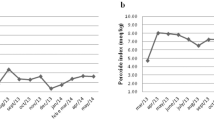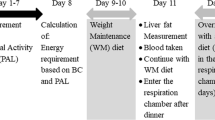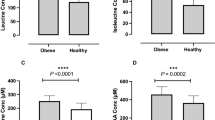Abstract
Objective:
Moderate alcohol consumption is associated with a decreased risk of type II diabetes. This study investigates the effect of moderate alcohol consumption on adipokines and insulin sensitivity.
Subjects:
Twenty healthy, lean (body mass index (BMI) 18.5–25 kg/m2; n=11) or overweight (BMI>27 kg/m2; n=9) men (18–25 years).
Methods:
Three cans of beer (40 g alcohol) or alcohol-free beer daily during 3 weeks.
Results:
Adiponectin and ghrelin concentrations increased (P<0.01) by 11 and 8%, while acylation-stimulating protein (ASP) concentrations decreased by 12% (P=0.04) after moderate alcohol consumption. Concentrations of leptin and resistin remained unchanged. Insulin sensitivity by an oral glucose tolerance test (OGTT) was not affected by moderate alcohol consumption, but 2 h glucose concentrations were lower (P=0.01) after beer (4.5±0.1 mmol/l) than alcohol-free beer (4.9±0.1 mmol/l). Both free fatty acids and glucagon concentrations showed a stronger increase (P<0.01) after 90 min during OGTT after beer than alcohol-free beer. Changes of adiponectin were positively correlated (r=0.69, P<0.001), and changes of leptin (r=−0.53, P=0.016) and ASP (r=−0.43, P=0.067) were negatively correlated with changes of insulin sensitivity index. All these results did not differ between lean and overweight men.
Conclusions:
Moderate alcohol consumption increased adiponectin and ghrelin, while it decreased ASP concentrations both in lean and overweight men. These changes are in line with the hypothesized improvement of insulin sensitivity, but did not affect insulin sensitivity within 3 weeks of moderate alcohol consumption.
This is a preview of subscription content, access via your institution
Access options
Subscribe to this journal
Receive 12 print issues and online access
$259.00 per year
only $21.58 per issue
Buy this article
- Purchase on Springer Link
- Instant access to full article PDF
Prices may be subject to local taxes which are calculated during checkout


Similar content being viewed by others
References
Abbasi F, Chu JW, Lamendola C, McLaughlin T, Hayden J, Reaven GM et al. (2004). Discrimination between obesity and insulin resistance in the relationship with adiponectin. Diabetes 53, 585–590.
Ahren B, Larsson H (2001). Impaired glucose tolerance (IGT) is associated with reduced insulin-induced suppression of glucagon concentrations. Diabetologia 44, 1998–2003.
Asensio C, Cettour-Rose P, Theander-Carrillo C, Rohner-Jeanrenaud F, Muzzin P (2004). Changes in glycemia by leptin administration or high-fat feeding in rodent models of obesity/type 2 diabetes suggest a link between resistin expression and control of glucose homeostasis. Endocrinology 145, 2206–2213.
Avogaro A, Watanabe RM, Dall'Arche A, de Kreutzenberg SV, Tiengo A, Pacini G (2004). Acute alcohol consumption improves insulin action without affecting insulin secretion in type 2 diabetic subjects. Diabetes Care 27, 1369–1374.
Avogaro A, Watanabe RM, Gottardo L, de Kreutzenberg S, Tiengo A, Pacine G (2002). Glucose tolerance during moderate alcohol intake: insights on insulin action from glucose/lactate dynamics. J Clin Endocrinol Metab 87, 1233–1238.
Bell RA, Mayer-Davis EJ, Martin MA, D'Agostino RB, Haffner SM (2000). Associations between alcohol consumption and insulin sensitivity and cardiovascular disease risk factors: the Insulin Resistance and Atherosclerosis Study. Diabetes Care 23, 1630–1636.
Beulens JW, van Beers RM, Stolk RP, Schaafsma G, Hendriks HF (2006). The effect of moderate alcohol consumption on fat distribution and adipocytokines. Obesity (Silver Spring) 14, 60–66.
Broglio F, Arvat E, Benso A, Gottero C, Muccioli G, Papotti M et al. (2001). Ghrelin, a natural GH secretagogue produced by the stomach, induces hyperglycemia and reduces insulin secretion in humans. J Clin Endocrinol Metab 86, 5083–5086.
Cederholm J, Wibell L (1990). Insulin release and peripheral sensitivity at the oral glucose tolerance test. Diabetes Res Clin Pract 10, 167–175.
Cordain L, Bryan ED, Melby CL, Smith MJ (1997). Influence of moderate daily wine consumption on body weight regulation and metabolism in healthy free-living males. J Am Coll Nutr 16, 134–139.
Cordain L, Melby CL, Hamamoto AE, O'Neill DS, Cornier MA, Barakat HA et al. (2000). Influence of moderate chronic wine consumption on insulin sensitivity and other correlates of syndrome X in moderately obese women. Metabolism 49, 1473–1478.
Date Y, Nakazato M, Hashiguchi S, Dezaki K, Mondal MS, Hosoda H et al. (2002). Ghrelin is present in pancreatic alpha-cells of humans and rats and stimulates insulin secretion. Diabetes 51, 124–129.
Davies MJ, Baer DJ, Judd JT, Brown ED, Campbell WS, Taylor PR (2002). Effects of moderate alcohol intake on fasting insulin and glucose concentrations and insulin sensitivity in postmenopausal women: a randomized controlled trial. JAMA 287, 2559–2562.
Furuya DT, Binsack R, Onishi ME, Monteiro SP, Fabres MU (2005). Low ethanol consumption induces enhancement of insulin sensitivity in liver of normal rats. Life Sci 77, 1813–1824.
Gomez-Ambrosi J, Fruhbeck G (2001). Do resistin and resistin-like molecules also link obesity to inflammatory diseases? Ann Intern Med 135, 306–307.
Gutt M, Davis CL, Spitzer SB, Llabre MM, Kumar M, Czarnecki EM et al. (2000). Validation of the insulin sensitivity index (ISI(0,120)): comparison with other measures. Diabetes Res Clin Pract 47, 177–184.
Havel PJ (2004). Update on adipocyte hormones: regulation of energy balance and carbohydrate/lipid metabolism. Diabetes 53 (Suppl 1), S143–S151.
Janke J, Engeli S, Gorzelniak K, Luft FC, Sharma AM (2002). Resistin gene expression in human adipocytes is not related to insulin resistance. Obes Res 10, 1–5.
Kiechl S, Willeit J, Poewe W, Egger G, Oberhollenzer F, Muggeo M et al. (1996). Insulin sensitivity and regular alcohol consumption: large, prospective, cross sectional population study (Bruneck study). BMJ 313, 1040–1044.
Koistinen HA, Vidal H, Karonen SL, Dusserre E, Vallier P, Koivisto VA et al. (2001). Plasma acylation stimulating protein concentration and subcutaneous adipose tissue C3 mRNA expression in nondiabetic and type 2 diabetic men. Arterioscler Thromb Vasc Biol 21, 1034–1039.
Koppes LL, Dekker JM, Hendriks HF, Bouter LM, Heine RJ (2005). Moderate alcohol consumption lowers the risk of type 2 diabetes: a meta-analysis of prospective observational studies. Diabetes Care 28, 719–725.
Laws A, Hoen HM, Selby JV, Saad MF, Haffner SM, Howard BV (1997). Differences in insulin suppression of free fatty acid levels by gender and glucose tolerance status. Relation to plasma triglyceride and apolipoprotein B concentrations. Insulin Resistance Atherosclerosis Study (IRAS) Investigators. Arterioscler Thromb Vasc Biol 17, 64–71.
Lee JH, Chan JL, Yiannakouris N, Kontogianni M, Estrada E, Seip R et al. (2003). Circulating resistin levels are not associated with obesity or insulin resistance in humans and are not regulated by fasting or leptin administration: cross-sectional and interventional studies in normal, insulin-resistant, and diabetic subjects. J Clin Endocrinol Metab 88, 4848–4856.
Matsuda M, DeFronzo RA (1999). Insulin sensitivity indices obtained from oral glucose tolerance testing: comparison with the euglycemic insulin clamp. Diabetes Care 22, 1462–1470.
Matthan NR, Cianflone K, Lichtenstein AH, Ausman LM, Jauhiainen M, Jones PJ (2001). Hydrogenated fat consumption affects acylation-stimulating protein levels and cholesterol esterification rates in moderately hypercholesterolemic women. J Lipid Res 42, 1841–1848.
McCarty MF (2001). Does regular ethanol consumption promote insulin sensitivity and leanness by stimulating AMP-activated protein kinase? Med Hypotheses 57, 405–407.
Meier U, Gressner AM (2004). Endocrine regulation of energy metabolism: review of pathobiochemical and clinical chemical aspects of leptin, ghrelin, adiponectin, and resistin. Clin Chem 50, 1511–1525.
Murata M, Okimura Y, Iida K, Matsumoto M, Sowa H, Kaji H et al. (2002). Ghrelin modulates the downstream molecules of insulin signaling in hepatoma cells. J Biol Chem 277, 5667–5674.
Murray I, Sniderman AD, Havel PJ, Cianflone K (1999). Acylation stimulating protein (ASP) deficiency alters postprandial and adipose tissue metabolism in male mice. J Biol Chem 274, 36219–36225.
Poykko SM, Kellokoski E, Horkko S, Kauma H, Kesaniemi YA, Ukkola O (2003). Low plasma ghrelin is associated with insulin resistance, hypertension, and the prevalence of type 2 diabetes. Diabetes 52, 2546–2553.
Purnell JQ, Weigle DS, Breen P, Cummings DE (2003). Ghrelin levels correlate with insulin levels, insulin resistance, and high-density lipoprotein cholesterol, but not with gender, menopausal status, or cortisol levels in humans. J Clin Endocrinol Metab 88, 5747–5752.
Roth MJ, Baer DJ, Albert PS, Castonguay TW, Dorgan JF, Dawsey SM et al. (2003). Relationship between serum leptin levels and alcohol consumption in a controlled feeding and alcohol ingestion study. J Natl Cancer Inst 95, 1722–1725.
Sarkola T, Dahl H, Eriksson CJ, Helander A (2003). Urinary ethyl glucuronide and 5-hydroxytryptophol levels during repeated ethanol ingestion in healthy human subjects. Alcohol Alcohol 38, 347–351.
Schouten HJA (1995). Aantal Mensen of Proefdieren in Twee Groepen, II. Klinische Statistiek: Een Praktische Inleiding in Methodologie en Analyse. Bohn Stafleu Van Loghum: Houten. pp 199–206.
Schrauwen P, Hesselink MK, Jain M, Cianflone K (2005). Acylation-stimulating protein: effect of acute exercise and endurance training. Int J Obes 29, 632–638.
Sierksma A, Patel H, Ouchi N, Kihara S, Funahashi T, Heine RJ et al. (2004). Effect of moderate alcohol consumption on adiponectin, tumor necrosis factor-alpha, and insulin sensitivity. Diabetes Care 27, 184–189.
van Oostrom AJ, van Dijk H, Verseyden C, Sniderman AD, Cianflone K, Rabelink TJ et al. (2004). Addition of glucose to an oral fat load reduces postprandial free fatty acids and prevents the postprandial increase in complement component 3. Am J Clin Nutr 79, 510–515.
Voedingscentrum (2003). Zo eet Nederland 1998; resultaten van de Voedselconsumptiepeiling 1998. Den Haag. pp 58–60.
Wannamethee SG, Shaper AG, Whincup PH (2005). Alcohol and adiposity: effects of quantity and type of drink and time relation with meals. Int J Obes 29, 1436–1444.
Yamauchi T, Kamon J, Waki H, Terauchi Y, Kubota N, Hara K et al. (2001). The fat-derived hormone adiponectin reverses insulin resistance associated with both lipoatrophy and obesity. Nat Med 7, 941–946.
Zilkens RR, Burke V, Watts G, Beilin LJ, Puddey IB (2003). The effect of alcohol intake on insulin sensitivity in men: a randomized controlled trial. Diabetes Care 26, 608–612.
Acknowledgements
We acknowledge all those involved in the conduct of the study and thank the volunteers for their enthusiastic participation. The research described in this article was funded by the Dutch Foundation for Alcohol Research (SAR).
Author information
Authors and Affiliations
Corresponding author
Additional information
Contributors: JWJB had full access to all of the data in the study and takes responsibility for the integrity of the data and the accuracy of the data analysis. Study concept and design:JWJB, FJK, GS, HFJH. Acquisition of data: JWJB, HFJH. Analysis and interpretation of the data:JWJB, ECdZ, FJK, GS, HFJH. Drafting of the manuscript: JWJB, ECdZ. Critical revision of the manuscript for important intellectual content: JWJB, ECdZ, FJK, GS, HFJH. Statistical analysis: JWJB, ECdZ. Study supervision: HFJH.
Rights and permissions
About this article
Cite this article
Beulens, J., de Zoete, E., Kok, F. et al. Effect of moderate alcohol consumption on adipokines and insulin sensitivity in lean and overweight men: a diet intervention study. Eur J Clin Nutr 62, 1098–1105 (2008). https://doi.org/10.1038/sj.ejcn.1602821
Received:
Revised:
Accepted:
Published:
Issue Date:
DOI: https://doi.org/10.1038/sj.ejcn.1602821
Keywords
This article is cited by
-
Prevalence and characteristics of alcohol consumption and risk of type 2 diabetes mellitus in rural China
BMC Public Health (2021)
-
Moderate consumption of fermented alcoholic beverages diminishes diet-induced non-alcoholic fatty liver disease through mechanisms involving hepatic adiponectin signaling in mice
European Journal of Nutrition (2020)
-
Alcohol, adipose tissue and liver disease: mechanistic links and clinical considerations
Nature Reviews Gastroenterology & Hepatology (2018)
-
Alcohol and Cardiovascular Risk in Women
Current Cardiovascular Risk Reports (2011)
-
The Effects of Macronutrient Intake on Total and High‐molecular Weight Adiponectin: Results From the OMNI‐Heart Trial
Obesity (2010)



